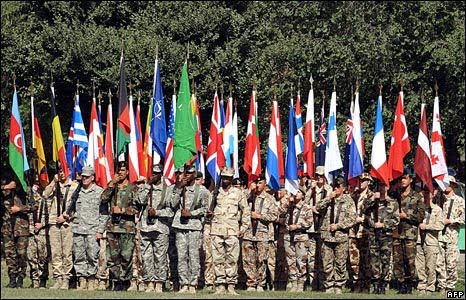
From Mary T. Curtin, Star Tribune: NATO plays an important role protecting the security that has enabled decades of European and North American peace and prosperity. But looking for an overly expansive role for it risks undermining its strength and lessening its value. . . .
NATO was conceived not just to protect Western European countries (and the United States and Canada) from outside attack, but also to create a sense of security that would enable peace and prosperity. NATO became an important part of Western Europe’s recovery and contributed to the fall of communism. . . .
While Europeans may not be as NATO-centric as Americans in their thinking, opinion polls show higher support in some European countries than in the U.S. But many see NATO’s founding purposes as still the cornerstone of its existence — a concern for collective defense and a desire for a broad security umbrella.
There are differences among the allies, of course. Some countries still cast a wary eye toward Russia. Others harbor lingering concerns about Germany. Stability is elusive in parts of the Balkans and a rising concern across the Mediterranean. Many Europeans want NATO focused on its core regional tasks.
Europeans are wary of war for a reason — they are not far removed from the devastation of World War II. The structures that helped stop the cycle of war they had endured for centuries are worth preserving. Creating stability in Europe has been good for the United States as well, both economically and politically, and NATO still has a role in maintaining this.
Yes, NATO should adapt as threats change. But expansive notions about NATO that detract from its core mission have been rejected by our allies in the past and risk undermining the good in what we have — one valuable instrument for regional security, but not the core of our engagement in the world.
Mary T. Curtin was a U.S. Department of State foreign service officer from 1986 to 2011. (photo: AFP/BBC)
Image: afp%20bbc%2011%2020%2009%20NATO%20soldiers_0.jpg
